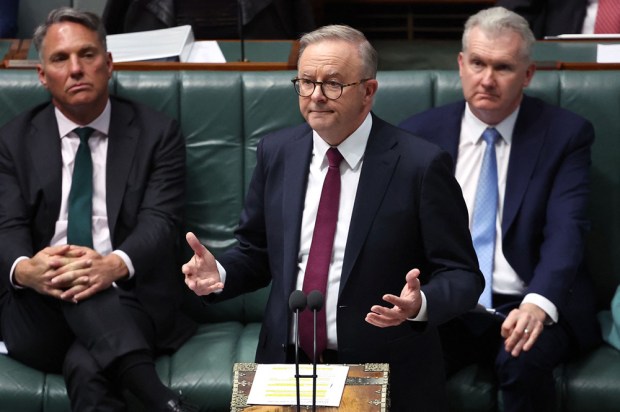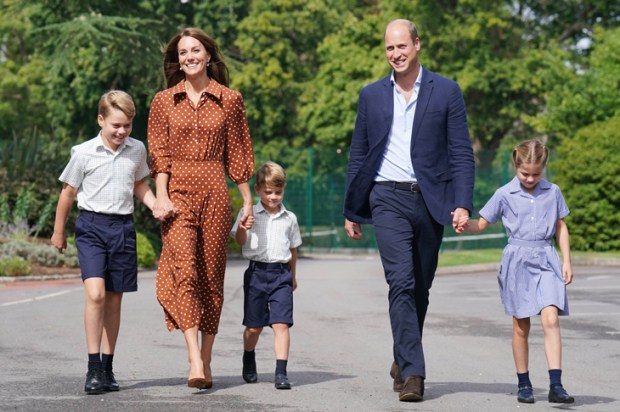Bill Shorten can now celebrate what must be the landmark success of his leadership. His coup has been to make same-sex marriage, unwisely branded as ‘marriage equality’, a front rank issue. It now ranks with or ahead of finding solutions for the Rudd–Gillard governments’ massive debt, billions wasted on long stalled global warming, terrorism here and abroad, the underfunded defence force and useless submarine fleet, and the need to water our continent.
Ostensibly inspired by the Irish referendum, Shorten’s move is being seen as a defence against his deputy Tanya Plibersek’s leadership ambitions, manifested by her attempt to strip Labor MPs of their conscience vote. In the meantime, Shorten’s denigration of Liberals not having a conscience vote is, as the French say, akin to the camembert telling the blue cheese ‘You stink’. Unlike Labor MPs, Liberal backbenchers may cross the floor with impunity. In any event let’s hope politicians don’t waste as much time on this as on the Keating-Turnbull republic.
They should not waste even one minute; the Australian people should own this decision. Even the preparation for a referendum could be left to an unpaid elected convention, where, outside of party politics, considered solutions would be more likely to emerge on this and other issues beyond the politicians such as indigenous recognition, federation and the GST. We should never forget that without such a convention we would probably be several countries like South America.
It’s acceptable that powers to legislate on a technical matter, say ‘posts and telegraphs’, include subsequently invented alternatives, such as television.But the same cannot be said of their power to make laws about marriage. The founders and the people were well aware of other forms of marriage, such as polygamy. They clearly intended that laws about marriage be strictly limited to a voluntary union entered into for life between a man and a woman to the exclusion of all others. (Although entered for life, it has long been accepted that a marriage can be dissolved by, or under, an act of parliament.) Notwithstanding the High Court’s comment when it invalidated an ACT attempt to introduce local same-sex marriages, it was never intended that politicians could introduce other forms of marriage.
There is but one way to interpret the Constitution: to ask what was the original intention of the founders and the people. That is what the Constitution means, even if some judges, like some politicians, think they are latter-day Humpty Dumptys, who famously said: ‘When I use a word it means just what I choose it to mean—neither more nor less.’
This is serious. If the Constitution means what the judges say it means, we’re handing them the keys to change our basic law. That role is specifically reserved by the Constitution to us, the people. But in recent years our rights have been scandalously ignored. Over the years Canberra has asked the people to reconsider their refusal to hand over nine subjects. On every occasion the people have refused, and referendums on most of those subjects would now be pointless. The High Court has ignored the clear wishes of the people and actually handed them over to the politicians. We can’t let this happen to the fundamental institution of our society – the family. It’s true that this has already been significantly weakened, beginning with the Whitlam government. Indeed the attorney general Lionel Murphy’s agenda to undermine the family, private property and religion seemed to come straight from Friederick Engels and Karl Marx.
The obviously compassionate Catholic Archbishop of Sydney, Anthony Fisher, pleads with activists not to further undermine the traditional family of mother, father and children in their campaign for the abstract feel-good notion of marriage equality. He has a point. Apart from an end to the criminalisation of their relationship, until recently two things were sought by same-sex couples − access to a partner in hospital, and that bequests under wills be respected. Now such relationships have been accorded full de facto recognition. If something more formal is needed, why is the civil union alternative dismissed when it could be a solution which satisfies both sides? And incidentally, what demand is there for change? You would have thought from the campaign in England and Wales that millions were waiting to marry. In the first three months the number marrying was akin to the number on Sydney’s cycleways.
The bien-pensant proponents of same-sex marriage should consider the unintended consequences of their all-or-nothing approach. While vast crowds celebrated recently at Dublin Castle, there was probably even greater joy in the Law Library of Ireland, the lawyers’ club. With marriage comes divorce. If this were the only consequence it wouldn’t be important. But that won’t be the end of the matter. Relying on the concept of ‘marriage equality’, an unintended consequence will be the open invitation to multicultural advocates to demand that the politicians do what the High Court has indicated is open to them, recognise polygamy. And don’t think that there aren’t already moves towards this. It was only parental outrage which reversed a recent decision by the NSW authorities to ban Anglican books in schools because they dared promote monogamy. In Britain, a former Archbishop of Canterbury has actually called for the partial introduction of Sharia law. Before it’s claimed the law already recognises polygamy, this is only for strictly limited purposes. For example, for the purposes of divorce law, a foreign marriage which is by its nature polygamous, is recognised.
In fact polygamy is already being practised in Australia, and is subsidised by the taxpayers. Centrelink says it is not for them to police the laws against polygamy. Does anyone? Recognition would legitimise such welfare dependence. It would also open up vast new horizons under the family reunion migration programme. This could encourage those multicultural phenomena, cousins marrying cousins, notwithstanding the deleterious impact this may have on offspring, and even arranged marriages for under-age girls. More reason then that the decision to introduce same-sex marriage should be owned by the people, as it was in Ireland, and not by politicians casting (or not casting, if Ms Plibersek undermines her leader) a so-called ‘conscience’ vote.
Got something to add? Join the discussion and comment below.
Get 10 issues for just $10
Subscribe to The Spectator Australia today for the next 10 magazine issues, plus full online access, for just $10.
You might disagree with half of it, but you’ll enjoy reading all of it. Try your first month for free, then just $2 a week for the remainder of your first year.













Comments
Don't miss out
Join the conversation with other Spectator Australia readers. Subscribe to leave a comment.
SUBSCRIBEAlready a subscriber? Log in